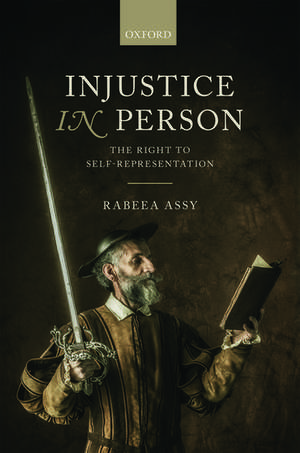Injustice in Person: The Right to Self-Representation
Autor Rabeea Assyen Limba Engleză Hardback – 4 iun 2015
Preț: 818.61 lei
Preț vechi: 1177.12 lei
-30% Nou
Puncte Express: 1228
Preț estimativ în valută:
156.69€ • 170.26$ • 131.71£
156.69€ • 170.26$ • 131.71£
Carte tipărită la comandă
Livrare economică 10-16 aprilie
Preluare comenzi: 021 569.72.76
Specificații
ISBN-13: 9780199687442
ISBN-10: 0199687447
Pagini: 252
Dimensiuni: 163 x 237 x 22 mm
Greutate: 0.58 kg
Editura: OUP OXFORD
Colecția OUP Oxford
Locul publicării:Oxford, United Kingdom
ISBN-10: 0199687447
Pagini: 252
Dimensiuni: 163 x 237 x 22 mm
Greutate: 0.58 kg
Editura: OUP OXFORD
Colecția OUP Oxford
Locul publicării:Oxford, United Kingdom
Recenzii
Rabeea Assys book is a refreshing and controversial challenge to the current orthodoxy. . . He has written a stimulating book from a new perspective. I warmly commend it to anyone who has a serious interest in access to justice issues.
Rabeea Assys Injustice in Person addresses one of the most difficult problems currently confronting courts in common law jurisdictions. Lawyers, judges and court administrators face increasing numbers of litigants in person (LIPs). The presence of LIPs demonstrates our collective failure to realize the ideal of access to justice for all. Injustice in Person provides a refreshingly clear consideration of the seemingly intractable issues surrounding the phenomenon of LIPs from a rich variety of perspectives. . . Assy demonstrates a masterful command of the principles of civil procedure and their theoretical underpinnings. He skillfully dissects the arguments favouring the right of self-representation and exposes the hopeless plight in which we leave LIPs.
Injustice in Person brings to the fore a central problem facing judicial systems around the world: how to respond when civil litigants have no lawyers to represent them. Ranging across continents, legal systems, and political theory, Dr Assy examines the law and history of the right to self-representation. This book clears a thicket of doctrine to offer a new and an insightful analysis of why self-representation is not a solution in theory or in practice for democracies, aspiring to provide effective access to judicial remedies.
Injustice in Person offers a path breaking analysis of the right to self-representation in the justice system. Drawing on examples from both civil and common law countries, Rabeea Assy provides a compelling argument for when litigants should not be allowed to represent themselves, in order to promote values of personal autonomy and procedural fairness.
Injustice in Person challenges the received wisdom that the value of self-representation outweighs considerations of efficiency, of rectitude of decision, or of desirable outcomes. In so doing it lays the foundation for a more enlightened and better informed debate about legal assistance, which may well have far reaching consequences for the administration of justice.
From the domain of outliers to our legal system, Dr Assy constructs a careful analysis of the obligations of a just society to provide access to the legal system. What is fascinating in this book, and completely novel to the best of my knowledge, is to place the right to self-representation in the context of a failed regime of liberal individualism. The result is a delightfully unexpected series of arguments about the importance of a societal commitment to affordable and meaningful legal process.
There is a critical justice gap in the western world. Slow, overpriced, and even overdrawn legal systems are leaving more and more people 'outside the law'. Many people are responding with self-help as litigants. Legal systems are discomforted by this, and ill equipped to accommodate this modern day phenomenon. This important monograph starts in the right place: with the importance of access to justice. One distinctly arguable response is individualism, which then calls on these legal systems to accommodate it in a much fuller way than they presently have. This is an important and challenging book in the context of one of the important issues, not just for law, but of our time.
Rabeea Assys Injustice in Person addresses one of the most difficult problems currently confronting courts in common law jurisdictions. Lawyers, judges and court administrators face increasing numbers of litigants in person (LIPs). The presence of LIPs demonstrates our collective failure to realize the ideal of access to justice for all. Injustice in Person provides a refreshingly clear consideration of the seemingly intractable issues surrounding the phenomenon of LIPs from a rich variety of perspectives. . . Assy demonstrates a masterful command of the principles of civil procedure and their theoretical underpinnings. He skillfully dissects the arguments favouring the right of self-representation and exposes the hopeless plight in which we leave LIPs.
Injustice in Person brings to the fore a central problem facing judicial systems around the world: how to respond when civil litigants have no lawyers to represent them. Ranging across continents, legal systems, and political theory, Dr Assy examines the law and history of the right to self-representation. This book clears a thicket of doctrine to offer a new and an insightful analysis of why self-representation is not a solution in theory or in practice for democracies, aspiring to provide effective access to judicial remedies.
Injustice in Person offers a path breaking analysis of the right to self-representation in the justice system. Drawing on examples from both civil and common law countries, Rabeea Assy provides a compelling argument for when litigants should not be allowed to represent themselves, in order to promote values of personal autonomy and procedural fairness.
Injustice in Person challenges the received wisdom that the value of self-representation outweighs considerations of efficiency, of rectitude of decision, or of desirable outcomes. In so doing it lays the foundation for a more enlightened and better informed debate about legal assistance, which may well have far reaching consequences for the administration of justice.
From the domain of outliers to our legal system, Dr Assy constructs a careful analysis of the obligations of a just society to provide access to the legal system. What is fascinating in this book, and completely novel to the best of my knowledge, is to place the right to self-representation in the context of a failed regime of liberal individualism. The result is a delightfully unexpected series of arguments about the importance of a societal commitment to affordable and meaningful legal process.
There is a critical justice gap in the western world. Slow, overpriced, and even overdrawn legal systems are leaving more and more people 'outside the law'. Many people are responding with self-help as litigants. Legal systems are discomforted by this, and ill equipped to accommodate this modern day phenomenon. This important monograph starts in the right place: with the importance of access to justice. One distinctly arguable response is individualism, which then calls on these legal systems to accommodate it in a much fuller way than they presently have. This is an important and challenging book in the context of one of the important issues, not just for law, but of our time.
Notă biografică
Dr Rabeea Assy is an Assistant Professor at the University of Haifa Law Faculty and a regular speaker at the University of Oxford. In 2011 Dr Assy obtained his DPhil from the University of Oxford, where he was a Clarendon Scholar and a Modern Law Review grantee. His LLB and LLM (ranked 1st in class, summa cum laude) were completed at the University of Haifa. In 2010-2011 Dr Assy was the Editor and subsequently the Editor-in-Chief of the Oxford University Commonwealth Law Journal, and in 2009 a Visiting Researcher at the Hauser Global Scholars Programme at New York University Law School. Dr Assy is an expert in comparative civil procedure. His work on litigation in person has earned him a number of prestigious awards and grants, including very generous research grants from the EU Marie Curie Actions Programme and the German-Israeli Fund. His work in this area has also been published in a number of leading journals across the Commonwealth.










